Showcase
The blog posts below showcase some of the work of MigNet members. They were written as part of a Special Feature of Discover Society 'Speaking Up, Not Talking Down' published in November 2019.
Afghan Interpreters Demand Rights, Not Favours
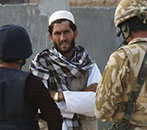
Sara de Jong
Recognising migrants as political actors is one important way to work against the representation of migrants as voiceless victims. Whereas institutional asylum frameworks create a circumscribed space for migrants’ voices, in which “asylum seekers are charged with narrating themselves in a condition of sanctuary” (Farrier 2012: 1), migrants have entered and created various other platforms to share their stories and demands. In these political spaces, migrants do not merely articulate personal grievances, but have added to a chorus of protest against undignified treatment. Former military interpreters from Afghanistan and Iraq, who had to leave their countries because their employment with Western forces left them exposed to threats, constitute a distinct and vocal subgroup of migrants who demand protection and rights. Read the full article
Focus: Speaking Up, Not Talking Down
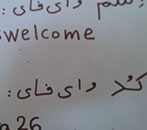
Simon Parker and Sara de Jong
“Go on look at me. […] What do you see? Maybe I am a refugee […] Maybe I am a story on the news, to turn off and forget.” The girl is looking at you squarely in the eye, walking directly towards you, emerging from a group of refugees fleeing a war zone. This Save the Children advert interrupts your relaxing evening during a commercial break of The Great British Bake Off. The girl’s call to ‘Look at me. Go on, look at me, don’t be shy’ and her piercing eyes, which do not let you avert yours, seeks to disrupt the mostly depersonalised images you watch on the news. Indeed the individualised appeal often feels harder to ignore and therefore could be an effective strategy for Save the Children’s fundraising campaign. But something gets lost in the choice between ‘huddled masses’ and individualised tragic faces, exemplified by the globally circulating image of the refugee toddler Alan Kurdi, who was found dead on the shore near Bodrum in Turkey. Read the full article
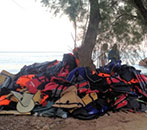
Simon Parker
When I first arrived in Skala Sikamineas in northern Lesvos one dark night in October 2015, the scene was chaotic. Parents with often very small children stood wet and shivering on the shingle beach, discarded life jackets were strewn everywhere, panicked young volunteers were running backwards and forwards to the water’s edge with foil blankets and hot drinks, while others tried to find warm clothes and blankets for those who had made it to the improvised reception facilities which numerous international volunteers had established along the one dirt track that led to the beach. A young female volunteer who could not have been more than 20 shouted at us when I switched on the video camera light “What the f--- do you think you are doing here? Switch that thing off!” I was deliberately not filming any of the refugees or volunteers but she wasn’t to know that and her anger was understandable. Aid workers literally had to elbow TV camera crews out of the way to get to the rubber dinghies and help the passengers off the rafts before the frailer passengers and children got soaking wet or fell into the water. Read the full article
Migrant Families Speaking Out and Speaking Up to Creatively Challende Stereotypical Representations
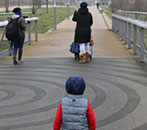
Umut Erel, Maggie O’Neill, Erene Kaptani and Tracey Reynolds
In our recent research project Participation Arts and Social Action in Research – PASAR, we explore how participatory action research engages migrant families as co-producers of knowledge. The project, funded by the National Centre for Research Methods and the Economic and Social Research Council, focuses on the potential of walking methods and participatory theatre to create a space for exploring, sharing and documenting processes of belonging and place-making; all of which are crucial to understanding and enacting citizenship. Based on Participatory Action Research principles of inclusion, valuing all voices and action-oriented interventions, we conceived of this project as a way of engaging with our research participants as a citizenship practice, that is, a socially transformative practice that challenges normative practices of who should be seen as belonging and having the right to participate. Using creative methods, we make explicit the experiences of our research participants, create a space for them to share their subjugated knowledges with each other, the research team, practitioners and policy makers. Read the full article
Migrant Language Policy in England: Missing the Multilingual Turn
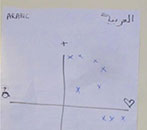
Sam Hellmuth
Last year I had the privilege of meeting up with a group of Syrian women and men, newly settled in Yorkshire under the Syrian Resettlement Programme, at a weekly drop-in organised by the Refugee Council. The purpose of our meeting was to talk about language. Working with two academic linguist colleagues, we prepared bilingual handouts in English and Arabic and the session itself proceeded primarily in Arabic. We provided English translation for the volunteers from the local community in the North Yorkshire market town that was host both to our event and to the Syrian families we had come to meet. I had instigated the event thinking that the language we most needed to talk about was Arabic. I wanted to check that Arabic-speaking families newly arrived in the UK knew that it was safe, and indeed best, for them to go on speaking Arabic at home. I had heard anecdotal stories of families being advised to start speaking English at home, to promote the children’s—or even the parents’—acquisition of English. As we shall see, this is bad advice, so we wanted to make sure that families had access to the facts. We called our event ‘Arabic at home’ and we went along prepared to explain the evidence around three key messages. Read the full article
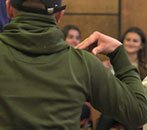
Rachel Alsop and Esme Madill
Children and young people fleeing traffickers, blood feuds, honour based violence and organised crime in Albania have a less than 0.5% chance of securing protection at first instance when seeking asylum in the UK. The treatment of Albanian cases does not match the reality on the ground in Albania. Albania is consistently in the top 5 or 6 applicant-producing countries of children seeking asylum in the UK. For the last five years, it has also been one of the top three source countries (aside from the UK) for children referred to the National Referral Mechanism as potential victims of trafficking. Such is the scale of the trafficking problem in Albania, that in October 2018 the Minister for Crime, Safeguarding and Vulnerability announced that the UK would spend at least £2m up to March 2021 to tackle Albanian modern slavery. And while the Home Office and Immigration Judges repeatedly state that Albanian victims of violence from traffickers, family members, gangs and organised crime will be protected by the Albanian state if returned, the 2018 US State Department reports of ‘significant human rights issues’ in Albania, with ‘pervasive corruption in all branches of government’. The limited existing research describes a country where the rule of law is weak, enabling, in the post-communist era, the resurgence of traditional Kanun law and related blood feuds. Read the full article
Telling Refugees' Stories: Artistic Representations of and Engagement with Migration Experiences
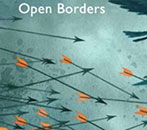
Evangeline Tsao
As millions of people are displaced worldwide as a consequence of wars, climate crisis and famine, over the past few years the forced migration of refugees has become, and continues to be above all a political ‘crisis’. Accompanying the rise of an increasingly state-led anti-immigration ideology there appears to be a lack of understanding of the critical challenges faced by refugees as well as a lack of empathy for those who are suffering. To bear witness to refugees’ experiences, and to raise questions regarding freedom of movement, humanity and global justice, an increasing number of artists—many of whom are also migrants themselves—are engaging with the topic of migration through their art projects. In this article, I reflect upon some of the artworks that focus on representing stories of migration— admittedly, those that particularly touched me—to discuss how their different approaches may evoke emotions and actions, with a hope for a better future. Read the full article
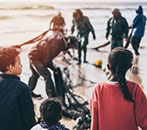
Claire Chambers
A recent news story about refugee writing that has attracted much attention worldwide concerns Behrouz Boochani. This Kurdish Iranian refugee texted the bulk of his Farsi memoir No Friend but the Mountains (2019) on WhatsApp to his translator while imprisoned for five years on Australia’s notorious refugee processing centre Manus Island. His creativity in the face of unfathomable cruelty functions as a timely reminder of the power of words. In the formulation of this special issue’s editors, Boochani speaks up to those who talk down to him and try to silence his agile thumbs. In doing so, he fashions imaginative worlds out of his constricted circumstances. Read the full article
Viewpoint: Lost in Media: Migrant Perspectives and the Public Sphere
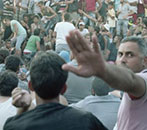
Ismail Einashe, Sara de Jong, Simon Parker and Daniel Trilling
While ‘migrants have entered European countries, […] they haven’t entered the public sphere‘ and if they do, ‘it is as characters in other people’s stories as something other’. This is the starting point of Lost in Media: Migrant Perspectives and the Public Sphere, a recently published collection of critical responses to the representations of migrants in the media in Europe by prominent writers, artists and journalists, including Guardian columnist Nesrine Malik and Cuban artist and activist Tania Bruguera, whose work was recently displayed in Tate Modern’s Turbine Hall. Read the full article
All articles published by Discover Society are covered by a Creative Commons licence, allowing share alike for non-commercial purposes, with attribution to author and link to the Discover Society web-page for the article, CC BY-NC-ND 3.0 https://discoversociety.org/about-us/
